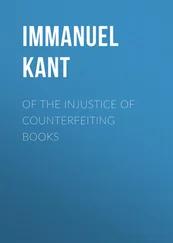For this reason, when it happens that there exists only a single word to express a certain conception, and this word, in its usual acceptation, is thoroughly adequate to the conception, the accurate distinction of which from related conceptions is of great importance, we ought not to employ the expression improvidently, or, for the sake of variety and elegance of style, use it as a synonym for other cognate words. It is our duty, on the contrary, carefully to preserve its peculiar signification, as otherwise it easily happens that when the attention of the reader is no longer particularly attracted to the expression, and it is lost amid the multitude of other words of very different import, the thought which it conveyed, and which it alone conveyed, is lost with it.
Plato employed the expression idea in a way that plainly showed he meant by it something which is never derived from the senses, but which far transcends even the conceptions of the understanding (with which Aristotle occupied himself), inasmuch as in experience nothing perfectly corresponding to them could be found. Ideas are, according to him, archetypes of things themselves, and not merely keys to possible experiences, like the categories. In his view they flow from the highest reason, by which they have been imparted to human reason, which, however, exists no longer in its original state, but is obliged with great labour to recall by reminiscence — which is called philosophy — the old but now sadly obscured ideas. I will not here enter upon any literary investigation of the sense which this sublime philosopher attached to this expression. I shall content myself with remarking that it is nothing unusual, in common conversation as well as in written works, by comparing the thoughts which an author has delivered upon a subject, to understand him better than he understood himself inasmuch as he may not have sufficiently determined his conception, and thus have sometimes spoken, nay even thought, in opposition to his own opinions.
Plato perceived very clearly that our faculty of cognition has the feeling of a much higher vocation than that of merely spelling out phenomena according to synthetical unity, for the purpose of being able to read them as experience, and that our reason naturally raises itself to cognitions far too elevated to admit of the possibility of an object given by experience corresponding to them — cognitions which are nevertheless real, and are not mere phantoms of the brain.
This philosopher found his ideas especially in all that is practical, 40 that is, which rests upon freedom, which in its turn ranks under cognitions that are the peculiar product of reason. He who would derive from experience the conceptions of virtue, who would make (as many have really done) that, which at best can but serve as an imperfectly illustrative example, a model for or the formation of a perfectly adequate idea on the subject, would in fact transform virtue into a nonentity changeable according to time and circumstance and utterly incapable of being employed as a rule. On the contrary, every one is conscious that, when any one is held up to him as a model of virtue, he compares this so-called model with the true original which he possesses in his own mind and values him according to this standard. But this standard is the idea of virtue, in relation to which all possible objects of experience are indeed serviceable as examples — proofs of the practicability in a certain degree of that which the conception of virtue demands — but certainly not as archetypes. That the actions of man will never be in perfect accordance with all the requirements of the pure ideas of reason, does not prove the thought to be chimerical. For only through this idea are all judgements as to moral merit or demerit possible; it consequently lies at the foundation of every approach to moral perfection, however far removed from it the obstacles in human nature — indeterminable as to degree — may keep us.
The Platonic Republic has become proverbial as an example — and a striking one — of imaginary perfection, such as can exist only in the brain of the idle thinker; and Brucker ridicules the philosopher for maintaining that a prince can never govern well, unless he is participant in the ideas. But we should do better to follow up this thought and, where this admirable thinker leaves us without assistance, employ new efforts to place it in clearer light, rather than carelessly fling it aside as useless, under the very miserable and pernicious pretext of impracticability. A constitution of the greatest possible human freedom according to laws, by which the liberty of every individual can consist with the liberty of every other (not of the greatest possible happiness, for this follows necessarily from the former), is, to say the least, a necessary idea, which must be placed at the foundation not only of the first plan of the constitution of a state, but of all its laws. And, in this, it not necessary at the outset to take account of the obstacles which lie in our way — obstacles which perhaps do not necessarily arise from the character of human nature, but rather from the previous neglect of true ideas in legislation. For there is nothing more pernicious and more unworthy of a philosopher, than the vulgar appeal to a so-called adverse experience, which indeed would not have existed, if those institutions had been established at the proper time and in accordance with ideas; while, instead of this, conceptions, crude for the very reason that they have been drawn from experience, have marred and frustrated all our better views and intentions. The more legislation and government are in harmony with this idea, the more rare do punishments become and thus it is quite reasonable to maintain, as Plato did, that in a perfect state no punishments at all would be necessary. Now although a perfect state may never exist, the idea is not on that account the less just, which holds up this maximum as the archetype or standard of a constitution, in order to bring legislative government always nearer and nearer to the greatest possible perfection. For at what precise degree human nature must stop in its progress, and how wide must be the chasm which must necessarily exist between the idea and its realization, are problems which no one can or ought to determine — and for this reason, that it is the destination of freedom to overstep all assigned limits between itself and the idea.
But not only in that wherein human reason is a real causal agent and where ideas are operative causes (of actions and their objects), that is to say, in the region of ethics, but also in regard to nature herself, Plato saw clear proofs of an origin from ideas. A plant, and animal, the regular order of nature — probably also the disposition of the whole universe — give manifest evidence that they are possible only by means of and according to ideas; that, indeed, no one creature, under the individual conditions of its existence, perfectly harmonizes with the idea of the most perfect of its kind — just as little as man with the idea of humanity, which nevertheless he bears in his soul as the archetypal standard of his actions; that, notwithstanding, these ideas are in the highest sense individually, unchangeably, and completely determined, and are the original causes of things; and that the totality of connected objects in the universe is alone fully adequate to that idea. Setting aside the exaggerations of expression in the writings of this philosopher, the mental power exhibited in this ascent from the ectypal mode of regarding the physical world to the architectonic connection thereof according to ends, that is, ideas, is an effort which deserves imitation and claims respect. But as regards the principles of ethics, of legislation, and of religion, spheres in which ideas alone render experience possible, although they never attain to full expression therein, he has vindicated for himself a position of peculiar merit, which is not appreciated only because it is judged by the very empirical rules, the validity of which as principles is destroyed by ideas. For as regards nature, experience presents us with rules and is the source of truth, but in relation to ethical laws experience is the parent of illusion, and it is in the highest degree reprehensible to limit or to deduce the laws which dictate what I ought to do, from what is done.
Читать дальше












